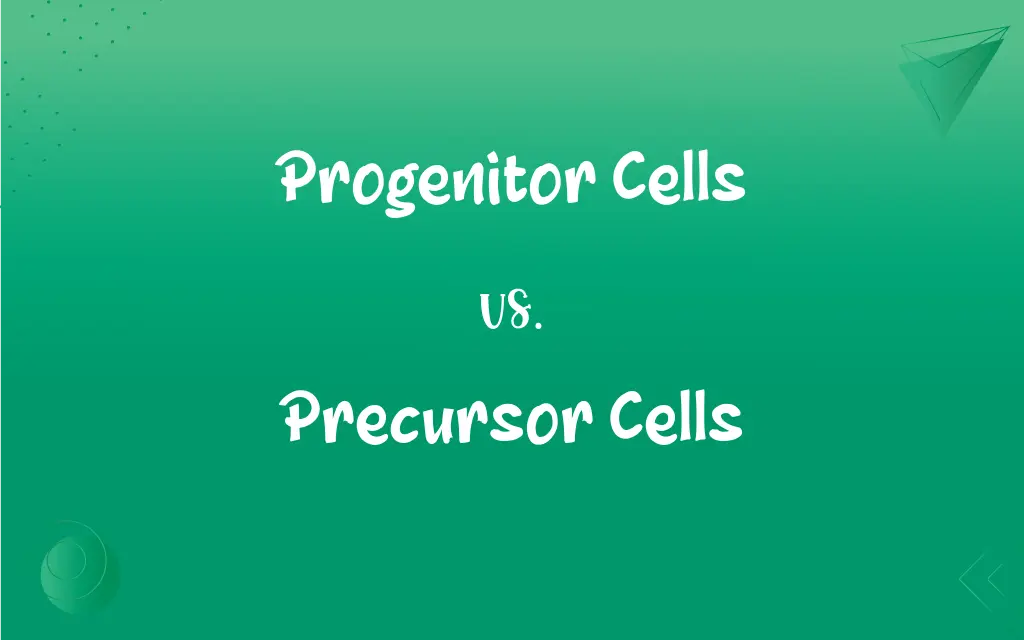Progenitor Cells vs. Precursor Cells: What's the Difference?
Edited by Aimie Carlson || By Janet White || Published on February 27, 2024
Progenitor cells are early descendants of stem cells with limited differentiation potential, while precursor cells are earlier, less differentiated cells leading to specific cell types.

Key Differences
Progenitor cells are a specific type of cell that emerge from stem cells. They have a more limited capacity for differentiation and self-renewal than stem cells. Precursor cells, on the other hand, are a broader category that includes any cell on the path to becoming a distinct, mature cell type, often more undifferentiated than progenitor cells.
Progenitor cells are often identified in the context of a specific lineage, like blood or neural progenitor cells, and have a limited ability to differentiate into a narrower range of cell types. Precursor cells are more general and can refer to any stage of differentiation prior to reaching a fully mature state, often with a wider potential for differentiation than progenitor cells.
The potential for replication and self-renewal in progenitor cells is typically less than that of stem cells, but greater than that of fully differentiated cells. Precursor cells, depending on their stage, may still possess significant potential for replication and differentiation before they commit to a specific cell fate.
Progenitor cells play a crucial role in replenishing and maintaining tissues where they reside, often seen in systems like the blood or skin. Precursor cells are essential in the early stages of development, guiding the gradual process of cell differentiation and maturation across various tissues.
In research and therapeutic applications, progenitor cells are targeted for their ability to repair specific tissues, owing to their more defined nature. Precursor cells are studied to understand the fundamental processes of cell development and differentiation, with implications for a broader range of therapeutic applications.
ADVERTISEMENT
Comparison Chart
Differentiation Potential
Limited to certain cell types
Wider range, more undifferentiated
Relation to Stem Cells
Direct descendants with less potential
Earlier in the differentiation pathway
Self-renewal Capacity
Less than stem cells, more than mature cells
Varies, generally higher than progenitor cells
Specificity
More specific to tissue types
Less specific, broader developmental stage
Application in Therapy
Targeted for repairing specific tissues
Studied for fundamental cell development
ADVERTISEMENT
Progenitor Cells and Precursor Cells Definitions
Progenitor Cells
Progenitor cells have restricted self-renewal ability.
Bone marrow progenitor cells help in the constant renewal of blood cells.
Precursor Cells
Precursor cells have broad differentiation potential.
Stem cell research focuses on manipulating precursor cells for therapy.
Progenitor Cells
Progenitor cells are specialized cells derived from stem cells with limited differentiation.
Neural progenitor cells are crucial for brain tissue repair.
Precursor Cells
Precursor cells are early-stage cells that precede mature cell types.
Blood precursor cells eventually develop into different blood cells.
Progenitor Cells
Progenitor cells are intermediates in cell differentiation.
Researchers are studying progenitor cells to understand tissue regeneration.
Precursor Cells
Precursor cells undergo a process of gradual maturation.
Neuronal precursor cells gradually differentiate into specialized neurons.
Progenitor Cells
Progenitor cells can differentiate into a limited number of cell types.
Progenitor cells in the skin give rise to various skin cell types.
Precursor Cells
Precursor cells are less differentiated than progenitor cells.
Precursor cells in the embryo can develop into multiple tissue types.
Progenitor Cells
Progenitor cells are often tissue-specific.
Cardiac progenitor cells play a role in heart muscle regeneration.
Precursor Cells
Precursor cells are key in early developmental stages.
Understanding precursor cells is crucial for developmental biology.
FAQs
Can progenitor cells become any cell type?
No, their differentiation is limited to certain cell types.
How do progenitor cells differ from stem cells?
They have less self-renewal capacity and more limited differentiation potential.
Are progenitor cells used in medical treatments?
Yes, particularly in regenerative medicine and tissue repair.
Do precursor cells have a specific function?
Their primary function is to gradually differentiate into mature cells.
What are progenitor cells?
Progenitor cells are specialized cells derived from stem cells with limited differentiation capacity.
Where are progenitor cells found?
They're found in many tissues, like bone marrow and the brain.
Where do precursor cells originate?
They originate from stem cells during the early stages of cell differentiation.
What diseases can progenitor cells help treat?
Diseases like anemia, certain cancers, and tissue degeneration.
Are precursor cells specific to a particular tissue?
They are less specific and can give rise to a variety of tissues.
Are progenitor cells found in adults?
Yes, in various tissues like skin, blood, and the brain.
How are precursor cells used in research?
They are used to study cell differentiation, developmental biology, and potential therapeutic applications.
What are precursor cells?
Precursor cells are early-stage cells with broad differentiation potential.
Can progenitor cells divide?
Yes, but their division potential is limited compared to stem cells.
What role do precursor cells play in embryonic development?
They are fundamental in forming the various tissues and organs.
Are precursor cells the same as stem cells?
No, they are a step further in the differentiation process than stem cells.
How long do progenitor cells live?
Their lifespan varies but is generally longer than mature cells and shorter than stem cells.
How do precursor cells change during development?
They gradually become more specialized and differentiated.
Can precursor cells be used in therapy?
Yes, especially in research focused on developmental processes and regenerative medicine.
What role do progenitor cells play in the body?
They help maintain and repair tissues by differentiating into specific cell types.
Can precursor cells be artificially created?
Yes, through techniques like induced pluripotent stem cell technology.
About Author
Written by
Janet WhiteJanet White has been an esteemed writer and blogger for Difference Wiki. Holding a Master's degree in Science and Medical Journalism from the prestigious Boston University, she has consistently demonstrated her expertise and passion for her field. When she's not immersed in her work, Janet relishes her time exercising, delving into a good book, and cherishing moments with friends and family.
Edited by
Aimie CarlsonAimie Carlson, holding a master's degree in English literature, is a fervent English language enthusiast. She lends her writing talents to Difference Wiki, a prominent website that specializes in comparisons, offering readers insightful analyses that both captivate and inform.






































































